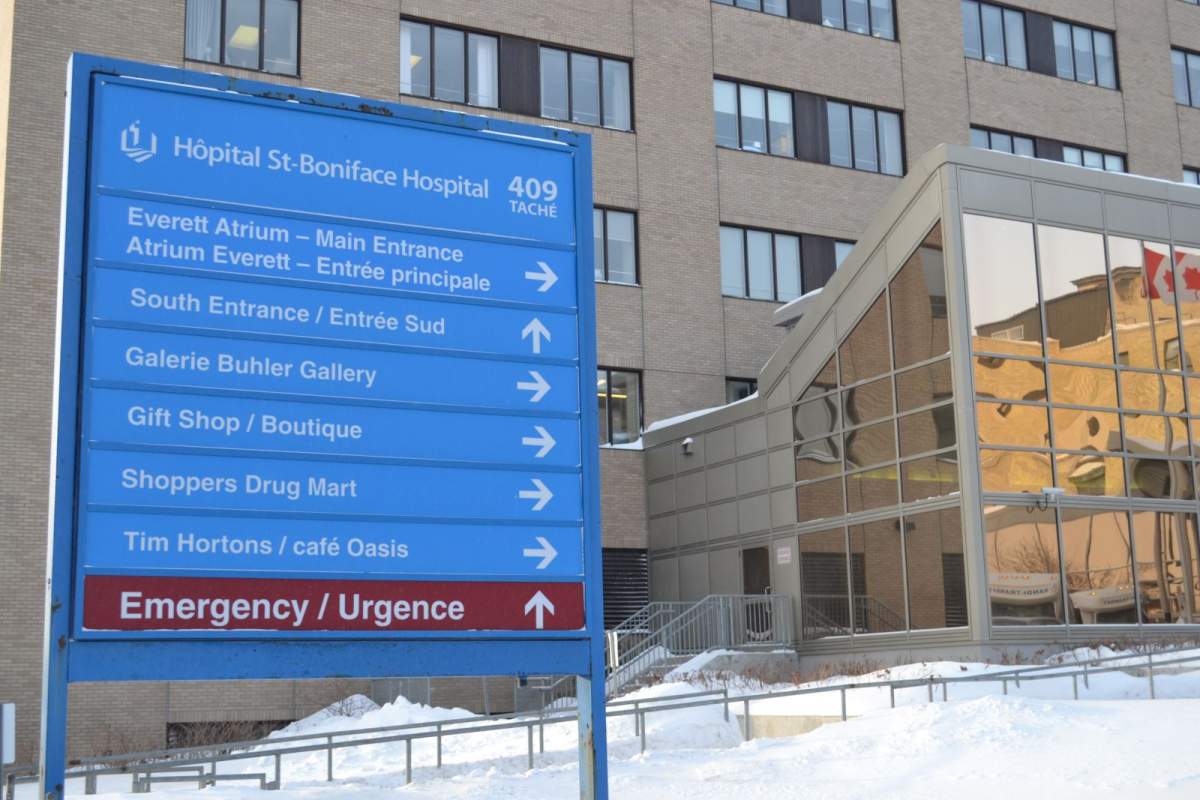The staff at St. Boniface Hospital’s echocardiography department were recently sent home to self-isolate after someone in that department tested positive for COVID-19, according to Shared Health.

And it’s not the only case of a health-care worker reportedly getting sick with the virus in Manitoba.
On Tuesday, the province confirmed a Selkirk hospital employee tested positive for COVID-19, and the Manitoba Nurses Union says a nurse at a hospital emergency department in Winnipeg has also tested positive and is self-isolating.
A spokesperson for Shared Health told Global News precautions are now being taken at at St. Boniface Hospital’s echocardiography department.
“All staff members in the department – 13 individuals in total – were immediately notified and sent home to self-isolate while contact tracing was completed.
“Any staff determined to have had close contact with the individual while they were symptomatic have been directed to self-isolate for 14 days from the date of exposure.”
Due to the coronavirus pandemic, all elective echocardiographies were suspended last week, which reduced the number of exams to only those considered urgent and emergent. Arrangements have been made to bring in staff from other departments to ensure continuity of service.
The spokesperson said the entire department has been thoroughly cleaned and no patients have been identified as close contacts.
The situation is still being investigated by public health, occupational health, and infection prevention and control representatives.

Get weekly health news
“This news is upsetting to all of us,” said the spokesperson.
“Our thoughts are with the affected staff member, as well as all of their colleagues at the site. We implore all Manitobans – including health-care workers – to stay home when sick, even if symptoms are mild.”
As for the case at the Selkirk hospital, the province says the staff member who tested positive had recently travelled within Canada, and had been working while symptomatic between March 19 and 23.
Public health officials are tracking patients and other staff members who had close contact with the worker, and those people will have to self-isolate for 14 days.
Manitoba’s chief medical officer said earlier this week the province is investigating cases involving health-care workers who might have caught COVID-19 while on the job.
“Certainly in other jurisdictions there are, and we have been investigating some cases where that type of transmission is considered,” Dr. Brent Roussin said Tuesday.
“Certainly when we see such cases, the investigation will centre around that — whether it could have been contracted in the workplace as well as whether adequate (protective equipment) was used at the time.”
–With files from The Canadian Press

Questions about COVID-19? Here are some things you need to know:
Health officials caution against all international travel. Returning travellers are legally obligated to self-isolate for 14 days, beginning March 26, in case they develop symptoms and to prevent spreading the virus to others. Some provinces and territories have also implemented additional recommendations or enforcement measures to ensure those returning to the area self-isolate.
Symptoms can include fever, cough and difficulty breathing — very similar to a cold or flu. Some people can develop a more severe illness. People most at risk of this include older adults and people with severe chronic medical conditions like heart, lung or kidney disease. If you develop symptoms, contact public health authorities.
To prevent the virus from spreading, experts recommend frequent handwashing and coughing into your sleeve. They also recommend minimizing contact with others, staying home as much as possible and maintaining a distance of two metres from other people if you go out.
For full COVID-19 coverage from Global News, click here.













Comments